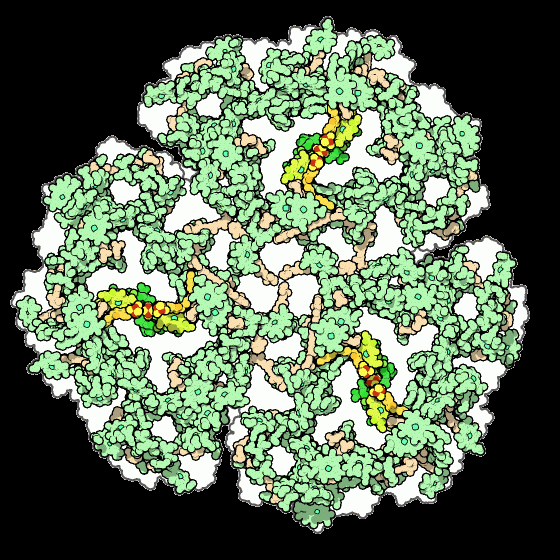I'm curious how that could work. That peaks my interest because I've known people who have autism and seem great at socializing. I don't have autism, but I'm very socially awkward, and if autistic people can do that I find it inspirational for my own socializing journey.
A podcaster on Radio Free Totebag casually said it, and idk if it was just as a passing joke, or if they were speaking factually. They mentioned a therapist not liking that they still say they're autistic when it's an old diagnosis.
This is untrue.
I'm going to explain autism and why you can't cure it or fix it by socialising but please don't take it as me trying to drag you or anything, it's just for educational purposes and to raise awareness.
So first off, autism is a neurodevelopmental disorder. The way that the autistic brain develops is fundamentally different to that of an allistic person (a person who is not autistic.)
Because of the differences in the brain, there is no diet or supplement or medication or behavioural exposure that can cure autism.
Autism is often seen from an outsider perspective as people who are socially awkward, who miss cues, who comes off as rude or arrogant, and who are very fixated on routines/rituals/narrow interests.
While this is generally true, it's not a complete picture. If we take asthma as an analogy, from the outside it looks like a person who is often breathless or who is unfit. But that doesn't capture the internal experience of asthma - one where your airways become inflamed and restricted, making it difficult if not downright impossible to get enough air into your lungs.
A person who has lost their breath can stop and regulate their breathing to address the issue. A person who is having an asthma attack will also be breathless but regulating your breathing has a very limited impact on the situation and it's not something that can be treated or fixed simply by learning how to breathe differently. In a similar way, if you understand autism simply as a condition that is characterised by social awkwardness then it's easy to presume that exposure therapy or coaching can fix the social awkwardness and thus cure the underlying condition.
The reality is that autism is a spectrum disorder, meaning that it is like an umbrella term for a collection of conditions that are interrelated and which present differently in different people. In diagnostic criteria autism is characterised by difficulties with socialising such as communication, reciprocity, and initiating and/or sustaining social contact as well as having repetitive behaviours, narrow interests that are excessive, and responses to sensory input being either markedly lower than typical or markedly higher (very often it's a combination).
Socialising can give autistic people the opportunity to develop their communication skills but it doesn't address the underlying impairment with regards to communication, and even if it did that wouldn't be sufficient to eliminate all the other parts of the condition.
Think of it like a person who has profound hearing loss - if they are exposed to behavioural supports and therapy through a speech pathologist, especially from a young age when the brain is developing all those connections for language, then they can develop the skills to speak although due to their disability they have to work a lot harder to compensate and they are always going to experience an atypical degree of difficulty in speaking. That's a lot like how it is for autistic people with regards to socialising.
(I've stuck to the diagnostic definition of autism here for the sake of simplicity and I have also avoided the discussion on the double-empathy problem and its implications for autistic communication because this is meant to be a 101, not a deep exploration of autism so don't take this as a personal statement of position or anything.)
I partially agree with you on this. I think you're right that there are probably developmental routes that the human brain can take.
My point of disagreement basically stems from my objection to the social model of disability, which I think you are either consciously drawing upon as influence or which you've arrived at as a concept independently, and my counterargument to this is that a disability is still going to cause impairment to the person regardless of the social context; you can take a person with paraplegia out into the woods, far away from society but their legs still aren't going to function properly.
Similarly, an autistic person might have very restricted eating habits (super common) and this is likely going to have health implications for the autistic person whether they're living in New York or if they're foraging for berries in the wilderness. A more personal example here is that I am diagnosed with catatonia due to autism and it's a pretty settled matter - I am responsive to treatment and diagnostic probes that confirm that it's catatonia to the exclusion of virtually any other condition. In this example, my particular flavour of autism is itself inherently disabling and although radical changes to how society functions and sets its expectations would improve my life, I'm still going to suffer from debilitating bouts of catatonia regardless.
Imo the same kinds of things can be said for ADHD and executive dysfunction, the overrepresentation in addiction stats, the associated ODD cluster of behaviours etc. although this topic is a huge discussion in itself.
(So there's something of a neurodivergent civil war being waged in the discourse of late and I guess I'm tiptoeing around this as best I can in my comments because I don't want to see a split occuring within the neurodivergent community here on Hexbear as I don't believe that it's either necessary or productive. But that means I'm constantly finding myself at odds talking about this stuff because I'm mediating tensions between the mainstream experience of autism from the outside looking in, the DSM and ICD diagnostic criteria - which are pretty lopsided and woeful in their own right, and my own understanding and personal experience of autism along with what I have learned from leaders in the autistic advocacy movement. Apologies in advance if I'm coming off as a bit evasive in what I have said above - all of this stuff is very fraught at the moment.)
Yes, we can improve our social skills with practice like anyone else, but autism can't be rid of. Difficulty socializing is just one out of many parts of being autistic anyway. Good luck with your journey :)
Of course the dark side is that there's a fine line between learning better social skills, and self-destructive masking.
I've hear of masking but I'm not clear on what it is. Can people without autism do masking? Or is it just people with autism?
Masking is a kind catch-all term for acting like a neurotypical person in social situations, in order to avoid social conflicts and misunderstandings. It's exhausting. Imagine being an actor doing a live stage play all day without a break. After a long day at work pretending to be neurotypical to fit in, we need to go home and just shut out the world and recharge in safe solitude. There's no energy left to do anything else. It's not about trying to deceive neurotypical people with malicious intent. It's just self-defence.
Autistic kids who aren't on the severe end of the spectrum tend to subconsciously learn masking at a very early age. After decades of doing this every single day we often have no idea who we really are anymore. That's why "unmasking" is so important for our mental health, even at the cost of one's social standing or career prospects. We're literally tired of literally acting. We just want to figure out who we really are, to be ourselves, to have society accept that, and for acquaintances and relatives and employers to make a few simple accommodations (like not springing unexpected short-notice same-day social event invitations on us) that would make our lives much less stressful.
Masking is the term for a neurodivergent person acting as if they are neurotypical. I'm sure there are some analogous behaviors for neurotypical people, but I don't think they're really quite the same thing, honestly.
There are many types of masking, I can only really attest to two: masking so people don't notice I'm neurodivergent, and one that many of us are familiar with, "professional" masking, where you put on your workplace attitude, laboring with a smile when supervisors are near etc, or dealing with customers in customer service etc, this is a "mask" you are forced to wear as you perform your duty
Similarly for people like me, I have to perform being 'normal' on top of that, otherwise it causes issues because of the societal expectations we live in with this late stage capitalist hellworld
Thats how I think about it anyway
I don't have any knowledge of the science behind this.
Anecdotally, I was diagnosed with Asperger's when I was about 12. I'm now in my early 30s and most people can't tell, and I'd even say it personally doesn't negatively impact me much anymore. I think this maybe due to the fact I was pretty socially active in my 20s and I sort learned to "work around" or compensate over time. Or maybe I was misdiagnosed, idk.
This is 100% just my totally subjective experience and shouldn't be taken as anything beyond that.
People with autism may not necessarily want to "get rid of" their autism. That is an ableist assumption.
Hm. Should I change it? I'm saying that's what I heard, but repeating it is the same as saying it, right?
Edit: Changed my question.
Autistic people want to improve their communication skills and get along with people better, but that isn't the same as getting rid of the autism. You can see what I'm getting at.
Some autistic people may want to get rid of their autism or autism symptoms, and others don't.
Correct me if I’m wrong but it’s less “socializing” and more putting your hand to the fire of social failure and learning to mask.
Woah thank you for the info, good to know the risks! Glad I never talk to anybody.
More socializing makes it easier to mask but you still have autism










